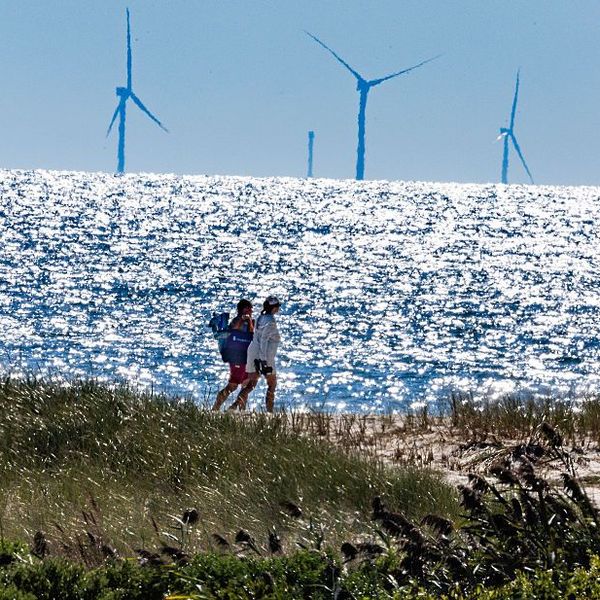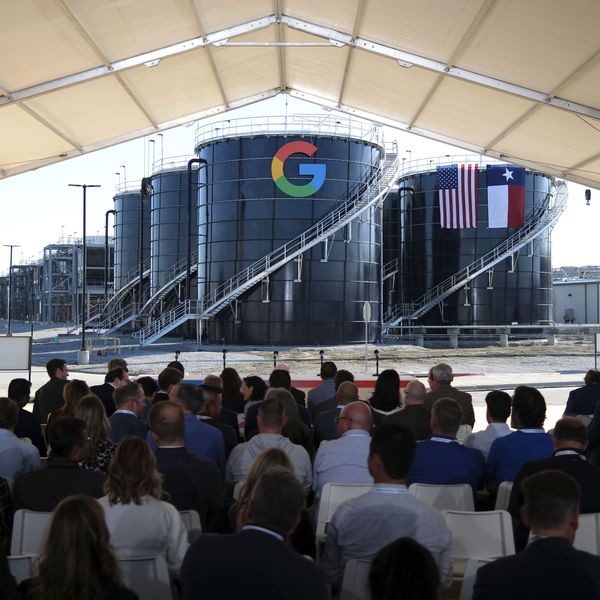In the nation's largest state, California, the major utility companies are trying to limit growth.
Of rooftop solar panels, that is.
According to reporting by Bloomberg, the state's three largest utilities--Edison International, PG&E Corp. and Sempra Energy--are "putting up hurdles" to homeowners who have installed sun-powered energy systems, especially those with "battery backups wired to solar panels," in order to slow the spread of what has become a threat to their dominant business model.
"The utilities clearly see rooftop solar as the next threat," Ben Peters, a government affairs analyst at solar company Mainstream Energy Corp., told Bloomberg. "They're trying to limit the growth."
According to Peters, as the business news outlet reports, the dispute between those with solar arrays and the utility giants "threatens the state's $2 billion rooftop solar industry and indicates the depth of utilities' concerns about consumers producing their own power. People with rooftop panels are already buying less electricity, and adding batteries takes them closer to the day they won't need to buy from the local grid at all."
Citing but one example, Bloomberg reports:
Matthew Sperling, a Santa Barbara, California, resident, installed eight panels and eight batteries at his home in April.
"We wanted to have an alternative in case of a blackout to keep the refrigerator running," he said in an interview. Southern California Edison rejected his application to link the system to the grid even though city inspectors said "it was one of the nicest they'd ever seen," he said.
"We've installed a $30,000 system and we can't use it," Sperling said.
The utilities argue that customers with solar energy-storing batteries might be rigging the system by fraudulently storing conventional energy sent in from the utility grid, storing it in the batteries, and then sending it back to the grid for credit. The solar companies say there is no proof that this is happening.
What environmentalists and solar energy advocates see is the utility companies putting barriers up to a decentralized system they will not any longer be able to control or profit from.
As Danny Kennedy, author of the book "Rooftop Revolution" and co-founder of solar company Sungevity in California, said in an interview with Alternet earlier this year:
Solar power represents a change in electricity that has a potentially disruptive impact on power in both the literal sense (meaning how we get electricity) and in the figurative sense of how we distribute wealth and power in our society. Fossil fuels have led to the concentration of power whereas solar's potential is really to give power over to the hands of people. This shift has huge community benefits while releasing our dependency on the centralized, monopolized capital of the fossil fuel industry. So it's revolutionary in the technological and political sense.
The tensions between decentralized forms of energy like rooftop solar or small-scale wind and traditional large-scale utilities is nothing new, but as the crisis of climate change has spurred a global grassroots movement push for a complete withdrawal from the fossil fuel and nuclear paradigm that forms the basis of the current electricity grid, these tensions are growing.
But the resistance to these changes is coming strongest from those with a vested interest in the status quo. With most focus on the behavior of the fossil fuel companies themselves, the idea that utility companies will be deeply impacted by this green energy revolution is often overlooked.
Earlier this summer, David Roberts, an energy and environmental blogger at Grist.org, wrote an extensive, multi-part series on the role of utilities in the renewable energy transition, explaining why understanding the politics and economics of the utility industry (despite the grand "tedium" of the task) will be essential for the remainder of the 21st century. Roberts wrote:
There's very little public discussion of utilities or utility regulations, especially relative to sexier topics like fracking or electric cars. That's mainly because the subject is excruciatingly boring, a thicket of obscure institutions and processes, opaque jargon, and acronyms out the wazoo. Whether PURPA allows IOUs to customize RFPs for low-carbon QFs is actually quite important, but you, dear reader, don't know it, because you fell asleep halfway through this sentence. Utilities are shielded by a force field of tedium.
It's is an unfortunate state of affairs, because this is going to be the century of electricity. Everything that can be electrified will be. (This point calls for its own post, but mark my words: transportation, heat, even lots of industrial work is going to shift to electricity.) So the question of how best to manage electricity is key to both economic competitiveness and ecological sustainability.


